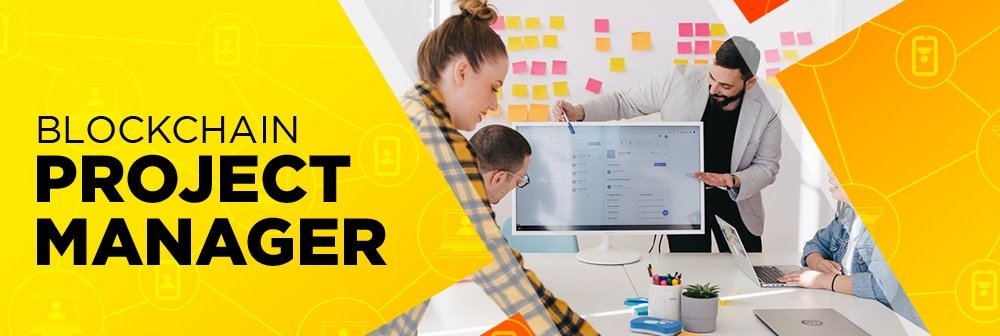Back in 2009, Satoshi Nakamoto introduced Bitcoin, and this made Blockchain technology attract a lot of attention. As a revolutionary technology, blockchain has seen a steady rise. This is despite the distrust that people had regarding it in recent years and thus did not want to identify with it. As things are at the moment, the digital space has given rise to immense job opportunities. Now this is making blockchain jobs more popular. There is a rise in demand in the job market, but still there exists a shortage of crucial skills. As a result, compensation for those who have the skills is currently higher compared to other fields.
But what does this mean for you? If you’re considering a career change or looking to advance your professional journey, the blockchain sector offers a plethora of opportunities with lucrative salaries and diverse roles. The demand for skilled professionals is skyrocketing, making now the perfect time to dive into this dynamic field.

Key Takeaways
- Diverse Opportunities: Blockchain careers span various roles, including developers, architects, consultants, and analysts, making it accessible to a wide range of professionals.
- High Demand and Salaries: With companies eager to implement blockchain solutions, skilled professionals can expect lucrative salaries and strong job security.
- Future Growth: The blockchain job market is projected to grow substantially, with a 25% increase in demand for roles like developers and architects expected by 2026.
- Continuous Innovation: Emerging trends such as decentralized finance (DeFi), non-fungible tokens (NFTs), and smart contracts create new roles and opportunities within the industry.
- Importance of Education: Pursuing relevant certifications and educational programs can enhance your qualifications and open doors to various blockchain roles.
Why Blockchain Jobs Are Booming in 2026 and Beyond
The blockchain industry is one of the fastest-growing sectors, with increasing adoption across multiple industries. Initially associated with cryptocurrencies like Bitcoin, blockchain technology is now being used in supply chain management, healthcare, banking, real estate, and even government operations. This surge in demand has led to an influx of blockchain job opportunities, offering competitive salaries and long-term career prospects.
Now, blockchain technology expertise is no doubt an emerging skill. Since no sector wishes to remain behind, there is a growing need for experts in blockchain. And in case you’ve been searching for careers within this particular sphere, then you ought to understand that employers vary. You also need to know who they are. Basically, employers in the sector fall into four distinct types. They include start-ups, big establishments, governments as well as tech firms. Each one of them invests large sums of money to access the top most services possible.
What Makes Blockchain Careers So Attractive?
- High demand for talent: Despite blockchain being a relatively new field, companies are scrambling to hire skilled professionals who can design, develop, and implement blockchain solutions. The competition for top talent means lucrative salaries and ample job openings.
- Diverse career paths: Blockchain is not just for tech professionals. It offers roles in project management, legal consulting, UX design, and even marketing, making it accessible to a broad range of professionals.
- Continuous innovation: Blockchain is still evolving. New developments like decentralized finance (DeFi), non-fungible tokens (NFTs), and smart contracts continue to create new roles and opportunities.
Quick Glance: Top 10 Best-Paying Blockchain Jobs ( 2026)
| Job Role | Average Salary ( 2026) | Key Skills Required |
|---|---|---|
| Blockchain Developer | $92,863 | Blockchain architecture, web development, cryptography |
| Blockchain Architect | $114,803 | CSS, HTML, React, Python, data science |
| Blockchain Administrator | $75,000 | Linux/UNIX, networking architecture, Bitcoin protocol |
| Blockchain Project Manager | $106,175 | Project management, blockchain communication |
| Blockchain UX Designer | $107,500 | UX design, blockchain comprehension, creativity |
| Blockchain Quality Engineer | $108k – $117k | Testing frameworks, bug identification, problem-solving |
| Blockchain Consultant | $135,000 | Strategy development, risk management, technical knowledge |
| Blockchain Legal Consultant | $100k – $190k | Legal regulations, fintech, smart contracts |
| Blockchain Engineer | $70,859 | Programming, supply and demand, blockchain engineering |
| Blockchain Analyst | $93,291 | Risk assessment, business strategy, blockchain analysis |
What Blockchain Jobs Are the Most Popular?

If the thought of creating a career out of blockchain intrigues you, then you ought to seek for more knowledge regarding the huge career prospects presented by this technology. Numerous opportunities exist in terms of careers in this field. This post looks at the best-paying Blockchain jobs today.
1. Blockchain Developer: The Foundation of Blockchain Ecosystems
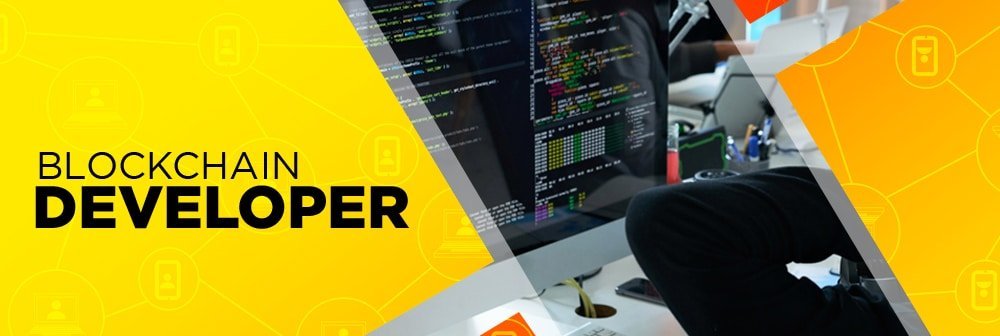
Blockchain developers are among the most in-demand professionals in the blockchain industry today, and for good reason. These developers design and implement the foundational systems and applications that run on blockchain technology. Their role is not only highly technical but also essential to the development of decentralized systems that revolutionize industries such as finance, healthcare, and logistics.
There are two main types of blockchain developers:
- Core Blockchain Developers: These developers are responsible for the architecture and security of a blockchain system. They design the protocols that make a blockchain network run. Also, they need to develop consensus algorithms that allow nodes to reach an agreement. Core developers also oversee network operations and the implementation of any changes or upgrades to the blockchain.
- Blockchain Software Developers: Unlike core developers, software blockchain developers create applications that run on blockchain networks. These applications, known as decentralized applications (dApps), require developers to work with smart contracts, APIs, and front-end interfaces. Blockchain software developers are essential to making blockchain technology accessible and useful for businesses and consumers alike.
Why It’s a High-Paying Job
Blockchain developers are at the heart of every blockchain project, tasked with creating the backbone of the system—the blockchain architecture. These systems must be secure, efficient, and scalable, which requires a deep understanding of decentralized technologies, cryptography, and distributed systems. Due to the high level of expertise required, blockchain developers command top salaries. Their contributions directly impact the success of blockchain projects, from decentralized finance (DeFi) platforms to supply chain transparency solutions.
As of 2026, blockchain developers can earn an average salary of $92,863 per year, with top earners making significantly more, especially if they work in specialized areas like Ethereum or Web3 development.
Key Skills Required
- Blockchain Architecture: Developers must understand blockchain’s decentralized nature and how it differs from traditional client-server models. Familiarity with various consensus mechanisms, like Proof of Work (PoW), Proof of Stake (PoS), and Byzantine Fault Tolerance, is critical. Developers should also know how to build smart contracts, which allow for automated, trustless transactions on a blockchain.
- Programming Languages: Blockchain developers need to master programming languages suited for blockchain development, such as Solidity (used for Ethereum smart contracts), C++, Python, JavaScript, and Go. These languages are used to develop both the core blockchain systems and the dApps that operate on them.
- Data Structures and Algorithms: A deep understanding of data structures such as Merkle trees and hash functions is vital. These structures enable efficient verification of blockchain transactions, ensuring security and data integrity.
- Cryptography: Since blockchain relies on cryptographic principles to secure data, developers must be proficient in hashing algorithms, encryption methods, and public-key cryptography. Mastery of these techniques ensures that blockchain systems remain secure and tamper-proof.
- Web Development: As blockchain becomes more integrated into web-based applications, blockchain developers should also be familiar with web development skills such as creating APIs, working with front-end interfaces, and integrating blockchain networks with web platforms.
- Networking and Peer-to-Peer Systems: Understanding how blockchain networks are built on peer-to-peer (P2P) systems is crucial for creating systems that are truly decentralized. Developers should know how to manage nodes, validate transactions, and optimize network performance.
Career Outlook
The demand for blockchain developers is expected to rise significantly as more industries recognize the potential of blockchain technology to increase transparency, security, and efficiency. By 2026, the blockchain development field is projected to grow by 25% annually, driven by the increasing use of blockchain in areas such as decentralized finance (DeFi), non-fungible tokens (NFTs), gaming, healthcare, and supply chain management.
- Finance (DeFi): Blockchain developers will play a key role in building decentralized financial systems that eliminate the need for traditional intermediaries like banks. DeFi platforms are creating a more transparent and inclusive financial ecosystem, with developers working on smart contracts that power lending, trading, and payment systems.
- Entertainment (NFTs): Non-fungible tokens have revolutionized the way digital assets are owned and traded. Blockchain developers are essential in creating the platforms and marketplaces where NFTs are bought and sold, ensuring secure and transparent ownership of digital art, music, and collectibles.
- Supply Chain: Blockchain is making waves in logistics by providing immutable records of goods as they move through the supply chain. Developers are building platforms that enable real-time tracking, ensuring the authenticity of products and reducing fraud.
- Healthcare: In healthcare, blockchain developers are building systems that allow for the secure sharing of medical records between patients and providers. These systems increase privacy, security, and interoperability, making healthcare more efficient and patient-centered.
Blockchain developers with strong expertise in the field will find that their skills are highly transferable across industries. As the technology continues to mature, the opportunities for career advancement in blockchain development are vast, making it a highly lucrative and future-proof career choice.
2. Blockchain Architect: Building the Blueprint for Success
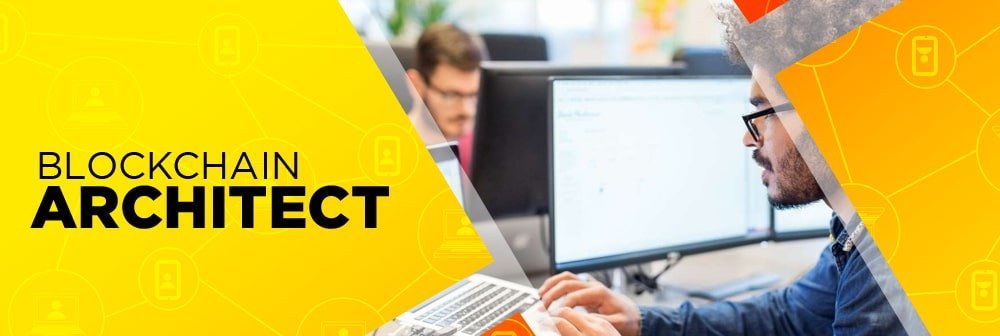
Blockchain architects play a critical role in shaping the future of decentralized technology by designing and overseeing the structure of blockchain systems. They are responsible for ensuring that all components of a blockchain system are integrated seamlessly and that the architecture is scalable, secure, and optimized for performance. Blockchain architects work closely with other departments, such as IT operations, network administrators, UX designers, and developers, to bring these systems to life.
Blockchain architects must stay up to date with the latest advancements in blockchain technology and have an in-depth understanding of decentralized systems. They are responsible for assigning, designing, and connecting the varied parts of blockchain solutions, including how these systems will interact with existing IT infrastructures. As the adoption of blockchain grows, the demand for skilled blockchain architects continues to rise, particularly in sectors like finance, healthcare, and supply chain management.
Why Blockchain Architects Are Vital
The importance of blockchain architects cannot be overstated, as they are responsible for creating the technical framework that underpins blockchain-based applications. Their job involves designing blockchain solutions that are not only technically sound but also aligned with a company’s overall objectives. Whether the goal is to develop decentralized applications (dApps) or create secure, scalable blockchain networks, blockchain architects ensure that these systems function smoothly and efficiently.
The technical expertise and strategic thinking required for this role make blockchain architects highly sought after. Their ability to design systems that integrate blockchain with existing technologies is crucial to a company’s success in implementing decentralized solutions. As a result, blockchain architects can command competitive salaries, with an average annual pay of $114,803, according to Indeed.com.
Key Skills Required
- System Architecture: Blockchain architects need a solid understanding of both centralized and decentralized systems. They must also know how to build blockchain solutions that integrate seamlessly with traditional IT infrastructures, ensuring a smooth and efficient transition to blockchain-based systems.
- Programming Languages and Protocols: In addition to blockchain-specific programming languages like Solidity (used in Ethereum), blockchain architects need to be familiar with standard web development tools such as JavaScript, HTML, and CSS. Experience with languages like Python, React, and Node.js is also beneficial, as these tools are frequently used in the development of blockchain-based applications.
- DevOps and IT Infrastructure: Blockchain architects must have a strong background in DevOps practices to ensure that the blockchain solutions they design can be deployed efficiently. This includes knowledge of cloud infrastructure, automated deployment tools, and continuous integration/continuous delivery (CI/CD) pipelines, all of which are essential for building scalable blockchain systems.
- Cryptography: Since security is a cornerstone of blockchain technology, blockchain architects need a deep understanding of cryptography. They must be proficient in techniques such as public-private key cryptography, hashing algorithms, and encryption to ensure that data on the blockchain is secure and tamper-proof.
- Data Science and AI: Many modern blockchain solutions leverage artificial intelligence (AI) for data analysis and predictive insights. Blockchain architects must be familiar with AI and data science techniques to design solutions that can process large volumes of data efficiently. This is particularly important in industries like finance and healthcare, where data security and accuracy are critical.
- Hands-On Blockchain Development Experience: While the role of a blockchain architect is more strategic than hands-on, practical experience in blockchain development is a significant advantage. Architects who have experience developing blockchain systems will have a deeper understanding of the challenges developers face, allowing them to create more effective and streamlined solutions.
Industry Insights
As more industries adopt blockchain technology, the demand for skilled blockchain architects continues to grow. In 2026, sectors such as healthcare, finance, and logistics are expected to drive much of this demand. Blockchain architects will play a vital role in helping these industries leverage blockchain technology for improved security, transparency, and efficiency.
- Healthcare: Blockchain is revolutionizing the healthcare industry by enabling secure sharing of patient data across hospitals and healthcare providers. Blockchain architects are designing solutions that allow for the secure transfer of medical records, improving patient care while maintaining data privacy and integrity.
- Finance: Financial institutions are increasingly turning to blockchain to improve transaction transparency and security. Blockchain architects are working on decentralized finance (DeFi) systems that remove the need for intermediaries, reduce costs and increase transaction speed.
- Supply Chain Management: In logistics and supply chain management, blockchain is being used to create transparent, immutable records of goods as they move through the supply chain. Blockchain architects are responsible for designing systems that track goods in real-time, providing increased transparency and reducing the risk of fraud.
- Government and Public Sector: Government agencies are also exploring the use of blockchain for secure voting systems, land registries, and digital identity verification. Blockchain architects in this sector are tasked with designing systems that can handle large-scale operations while maintaining the security and transparency that blockchain offers.
Career Outlook
The career outlook for blockchain architects is highly positive. As more organizations recognize the potential of blockchain technology, the demand for professionals who can design secure, scalable blockchain solutions will continue to rise. By 2026, the demand for blockchain architects is expected to grow by 20% annually as companies across industries adopt blockchain-based solutions to enhance security, transparency, and efficiency.
Blockchain architects will find themselves at the forefront of innovation, helping organizations build the infrastructure needed to support decentralized applications and systems. With the increasing adoption of blockchain in industries such as healthcare, finance, and logistics, blockchain architecture is a lucrative and future-proof career path that offers endless opportunities for growth.
Interesting in getting certified? Check out our favorite Blockchain Architect course here.
3. Blockchain Administrator: Keeping Blockchain Networks Running Smoothly
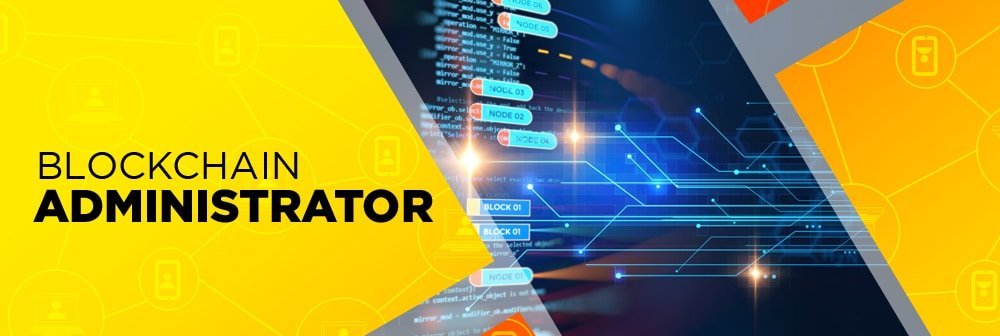
A blockchain administrator plays a crucial role in the smooth operation of blockchain networks. Their responsibilities revolve around setting up, maintaining, and ensuring the overall efficiency of the blockchain infrastructure. Administrators oversee critical components like nodes, security protocols, and access permissions to ensure the system runs reliably and securely. As blockchain becomes a key technology in various industries, the demand for skilled blockchain administrators has grown significantly, particularly in sectors like finance, healthcare, and logistics, where security and efficiency are paramount.
Blockchain administrators must coordinate with various teams, utilizing top talent to deliver business value through seamless blockchain operations. They play a pivotal role in monitoring the performance of blockchain networks, ensuring the integrity and smooth functioning of decentralized systems. As enterprises increasingly adopt blockchain technology, administrators are becoming indispensable in managing the infrastructure that supports this complex technology.
Why It’s a High-Paying Job
Blockchain administrators are responsible for safeguarding the backbone of a blockchain network. Their ability to manage and maintain the underlying infrastructure ensures the network remains secure, scalable, and efficient. The technical expertise required for this role—ranging from knowledge of cryptographic protocols to network architecture—makes it a highly specialized field. As companies face more security challenges and a greater need for robust blockchain networks, the demand for blockchain administrators has surged, leading to increased salaries and better job prospects.
Key Skills Required
- Operating Systems (Linux/UNIX Proficiency): Blockchain nodes typically run on Linux or UNIX operating systems. Administrators must be fluent in managing and configuring these environments. Tasks like setting up nodes, troubleshooting issues, and maintaining the operating system are part of the daily routine.
- Networking Services and Architecture: Administrators need an in-depth understanding of networking architecture, including peer-to-peer (P2P) systems that form the foundation of decentralized blockchain networks. They should be proficient in managing network connections, configuring firewalls, and optimizing network traffic to ensure smooth communication between blockchain nodes.
- Security and Encryption: Since blockchain networks deal with sensitive data, ensuring security is paramount. Administrators manage encryption protocols to protect transactions and private keys. They implement access control mechanisms and are responsible for safeguarding the network against attacks like Distributed Denial of Service (DDoS) or Sybil attacks. Understanding cryptographic techniques, such as hashing and digital signatures, is also vital.
- Virtualization and Cloud Technologies: As blockchain networks grow in size and complexity, many organizations are turning to cloud infrastructure and virtualization to scale their blockchain operations. Administrators must be comfortable with virtualization tools like Docker and cloud services like AWS or Microsoft Azure to deploy, manage, and scale blockchain nodes.
- Performance Monitoring and Optimization: Blockchain administrators are responsible for continuously monitoring network performance. This includes tracking node activity, transaction speeds, and network health. Administrators should be able to identify bottlenecks and optimize the network for performance, ensuring high availability and minimal downtime.
- Disaster Recovery and Backup: Since blockchain data is distributed and immutable, ensuring data integrity is crucial. Administrators need to establish backup protocols, disaster recovery plans, and strategies to quickly recover in the event of node failures or cyberattacks.
- Compliance and Regulatory Understanding: As blockchain use grows, administrators need to stay updated with regulatory requirements, particularly in industries like finance and healthcare. Understanding how to ensure compliance with data privacy laws (e.g., GDPR) while maintaining blockchain’s decentralized nature is becoming increasingly important.
Role Breakdown
Blockchain administrators serve as the guardians of the blockchain infrastructure. Their role involves:
- Setting up nodes: Administrators are responsible for deploying blockchain nodes that support the network’s decentralized structure. This includes configuring the nodes, ensuring they communicate with one another, and optimizing performance.
- Monitoring network performance: Keeping track of the blockchain network’s health, node activity, and transaction rates ensures that the system operates efficiently. Administrators must also be proactive in identifying potential issues that could compromise network security or performance.
- Managing access permissions and security: Administrators handle access controls, ensuring that only authorized personnel can modify or interact with the blockchain network. They also manage cryptographic keys and ensure that transactions are encrypted and secure.
- Maintaining data integrity: Blockchain administrators ensure that the distributed ledger remains consistent and that all nodes are synchronized. This is critical for preventing data loss or corruption in the network.
Career Outlook
With the exponential growth of blockchain technology across sectors like finance, healthcare, supply chain management, and government, the demand for skilled blockchain administrators is rising. More organizations are adopting blockchain to increase transparency, security, and efficiency, but running a blockchain network requires a specific set of skills that few professionals possess.
This has led to a surge in demand for blockchain administrators who can maintain secure and efficient networks. As blockchain technology becomes more mainstream, blockchain administrators can expect strong job growth, with more opportunities to specialize in emerging areas such as blockchain security and large-scale enterprise blockchain solutions.
- Financial Services: Blockchain administrators will be needed to maintain secure networks that power decentralized finance (DeFi) platforms, cross-border payments, and digital asset exchanges.
- Supply Chain Management: Blockchain is revolutionizing logistics by providing immutable records of transactions and products. Administrators will be essential in managing these blockchain systems to ensure the secure and efficient flow of data across the supply chain.
- Government and Public Sector: Governments are increasingly looking to blockchain to create secure, transparent voting systems and improve the management of public records. Blockchain administrators will play a key role in these efforts, ensuring the infrastructure is secure and compliant with regulations.
Salary Insights
The salary for blockchain administrators has seen a steady rise, driven by the growing demand for robust, secure blockchain infrastructures. According to ITJobsWatch, blockchain administrators now earn a median pay of £75,000 annually, with top-tier professionals earning even more, especially in regions with a high concentration of tech firms and blockchain startups. This reflects the increasing importance of their role in maintaining secure, high-performance blockchain networks.
4. Blockchain Project Manager: Bridging the Gap Between Tech and Business
Blockchain project managers play a pivotal role in the successful implementation of blockchain initiatives within organizations. They serve as the crucial link between the technical blockchain experts and the business side of the organization, ensuring that both teams align their efforts toward common objectives. Their role is multifaceted, requiring a blend of technical understanding, project management skills, and exceptional communication abilities.
As organizations increasingly adopt blockchain technology, the demand for skilled project managers who can navigate this complex landscape is growing. Project managers are tasked with defining the organization’s needs and translating those requirements into actionable plans for blockchain development teams. They are also responsible for simplifying technical jargon, ensuring that all stakeholders—regardless of their technical background—grasp the project’s goals and processes.
Job Overview
A blockchain project manager is responsible for overseeing blockchain projects from inception to completion. This includes:
- Project Planning: The role involves identifying project goals, timelines, and budgets. The project manager collaborates with stakeholders to develop a comprehensive project plan that outlines the scope, resources, and deliverables.
- Team Coordination: Working closely with developers, blockchain architects, and other technical team members to ensure that all parties understand their roles and responsibilities. This coordination is crucial for maintaining project momentum and meeting deadlines.
- Stakeholder Management: Engage with non-technical stakeholders to communicate project updates, address concerns, and gather feedback. Effective stakeholder management ensures that the project aligns with business objectives and delivers value.
- Quality Assurance: Implementing measures to ensure that the blockchain solutions developed meet industry standards and comply with regulations. This includes reviewing deliverables and conducting testing phases before the project launch.
Key Skills Required
- Communication and Collaboration: Project managers must excel at conveying complex technical concepts in a way that is accessible to non-technical stakeholders. Strong interpersonal skills foster collaboration between teams and ensure that everyone is on the same page throughout the project lifecycle.
- Blockchain-Specific Knowledge: While blockchain project managers do not need to be coders, they should possess a solid understanding of blockchain principles, smart contracts, and decentralized applications (dApps). This knowledge enables them to make informed decisions and guide their teams effectively.
- Project Management Skills: Proficiency in project management methodologies (such as Agile, Scrum, or Waterfall) is essential for structuring projects and tracking progress. Familiarity with project management tools can also enhance efficiency.
- Risk Management: Anticipating potential roadblocks, identifying risks early in the project, and developing mitigation strategies are key responsibilities. Effective risk management ensures that projects stay on track and can adapt to unforeseen challenges.
- Analytical Skills: A blockchain project manager should be able to analyze project metrics, assess performance, and make data-driven decisions. This analytical mindset helps in refining project strategies and achieving desired outcomes.
Market Demand
The demand for blockchain project managers is surging as blockchain technology becomes increasingly integral to various industries. Sectors like finance, supply chain, and healthcare are particularly keen on leveraging blockchain for its potential to enhance transparency, security, and efficiency.
By 2025, job openings for blockchain project managers are expected to rise by approximately 40%, reflecting the widespread adoption of blockchain solutions across organizations. As companies seek to capitalize on blockchain’s advantages, skilled project managers will be crucial in guiding these initiatives to success.
Compensation
According to Indeed.com, the average salary for blockchain project managers is around $106,175 per year. This figure can vary based on factors such as geographic location, industry, and individual experience levels. As demand for this role continues to grow, salaries are likely to increase, making blockchain project management an attractive career path for professionals looking to work at the intersection of technology and business.
5. Blockchain UX Designer: Simplifying Complex Technology for Users

Blockchain UX designers play a pivotal role in bridging the gap between sophisticated blockchain technology and everyday users. As the landscape of blockchain applications continues to evolve, the need for user-friendly interfaces becomes paramount. These designers focus on creating intuitive, engaging, and accessible experiences that cater to both seasoned blockchain enthusiasts and newcomers alike. Their work ensures that blockchain solutions are not only functional but also appealing to users, which is essential for the technology’s widespread adoption.
In today’s market, where both start-ups and established companies strive for competitive edges, launching user-friendly products is vital. A well-designed user experience can significantly enhance user engagement, retention, and overall satisfaction, ultimately leading to the success of blockchain ventures.
Key Responsibilities
- User-Centric Design: Blockchain UX designers prioritize the needs and preferences of users when creating interfaces. They conduct extensive user research to understand how users interact with blockchain applications and identify pain points that can be addressed through design.
- Interface Design: These designers craft visually appealing and functional interfaces that simplify complex processes like wallet management, transaction execution, and NFT trading. By emphasizing clarity and usability, they enhance the overall user experience.
- Collaboration: Effective communication is crucial in this role. Blockchain UX designers work closely with cross-functional teams, including blockchain developers, product managers, and marketing professionals, to align design strategies with technical capabilities and business goals.
- Testing and Iteration: Blockchain UX designers utilize wireframing and prototyping tools to create and test design concepts. Gathering user feedback during these stages allows designers to iterate on their work, ensuring the final product meets user expectations.
Importance of UX in Blockchain
As blockchain technology gains traction across various industries, the importance of user experience cannot be overstated. A well-designed user interface can demystify complex blockchain processes and make decentralized applications (dApps) more accessible to non-technical users. Here are several key reasons why UX design is crucial in the blockchain space:
- Adoption Barrier Reduction: Many potential users may be intimidated by blockchain technology due to its complexity. Thoughtful UX design can simplify interactions and make it easier for users to navigate blockchain applications, lowering the barrier to entry.
- Enhancing Trust: A seamless and intuitive user experience fosters trust. Users are more likely to engage with blockchain applications that feel reliable and secure. Effective UX design can provide users with the confidence they need to participate in blockchain ecosystems.
- Improving Accessibility: By designing with inclusivity in mind, UX designers can ensure that blockchain applications are accessible to a diverse audience, including those with varying levels of technical expertise.
- Facilitating User Retention: Positive user experiences lead to higher retention rates. When users find it easy and enjoyable to use a blockchain application, they are more likely to return and recommend it to others.
Key Skills Required
To excel as a blockchain UX designer, candidates must possess a unique blend of creativity, technical understanding, and communication skills:
- User Research: Understanding the target audience is foundational. UX designers must be adept at conducting interviews, surveys, and usability tests to gather insights into user needs, behaviors, and preferences.
- Wireframing and Prototyping: Proficiency in design tools such as Sketch, Figma, or Adobe XD is essential. Designers must be able to quickly create wireframes and prototypes to visualize their concepts and gather feedback.
- Blockchain Comprehension: A solid grasp of blockchain technology is crucial. UX designers should understand how blockchain works, including transaction flows, smart contracts, and wallet functionalities, to create user-friendly interactions that address common challenges like private key management.
- Interaction Design: Designers should have a keen eye for detail and an understanding of how users interact with digital products. This includes knowledge of usability principles, design patterns, and visual hierarchy.
- Communication Skills: Excellent verbal and written communication skills are vital for collaborating with team members and articulating design choices to stakeholders. Designers must be able to advocate for user needs while balancing technical constraints.
Career Insights
The demand for blockchain UX designers is on the rise. This growth is driven by the increasing popularity of consumer-facing blockchain products. Moreover, as the market for decentralized finance platforms, NFT marketplaces, and gaming dApps expands, companies are recognizing the need for skilled UX designers. These professionals are essential for enhancing user adoption and satisfaction.
According to industry reports, the field is projected to grow by 30% over the next five years. Therefore, this makes it a promising career choice for aspiring designers.
In terms of compensation, a blockchain UX designer in the United States can expect to earn an average salary of $107,500 per year. However, there are opportunities for higher earnings based on experience and expertise. As more businesses prioritize user experience in their blockchain products, professionals in this field can look forward to rewarding career prospects. Additionally, they will find significant growth opportunities. Ultimately, this role allows designers to shape the future of how users interact with blockchain technology.
6. Blockchain Quality Engineer: Ensuring Top-Notch Performance and Security
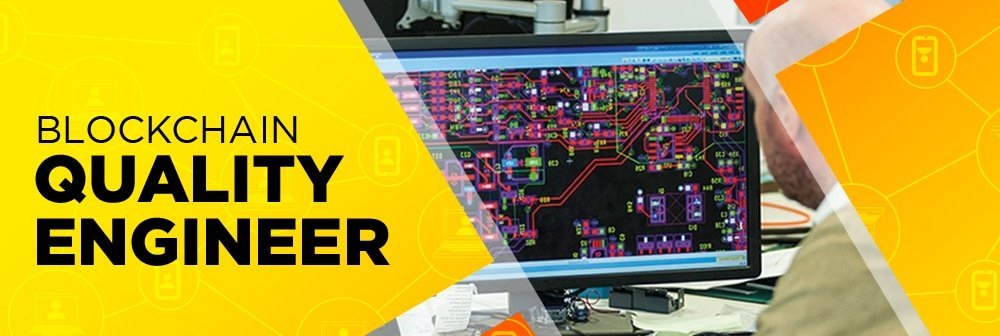
Blockchain quality engineers play a crucial role in the development of blockchain technology by ensuring that all blockchain applications and systems maintain the highest standards of performance, security, and reliability. Their work involves creating and implementing comprehensive testing strategies to identify and resolve issues before the final product is launched. With the increasing complexity of blockchain systems, the need for dedicated quality engineers has never been more critical.
These engineers work with both automation frameworks and manual testing procedures to verify that blockchain applications function as intended. Their goal is to ensure that the final product is free from bugs or glitches, delivering a seamless user experience. This involves developing testing protocols, monitoring performance metrics, and collaborating with developers to fix any identified issues.
Why It’s a High-Paying Job
Blockchain quality engineers play a crucial role in maintaining the integrity of blockchain applications. They are especially important in industries such as finance and healthcare, where these systems handle sensitive transactions. Their expertise helps identify potential security vulnerabilities. Additionally, they address performance bottlenecks. This expertise directly impacts the success of blockchain projects.
According to a report by Glassdoor, blockchain quality engineers can expect to earn between $108,000 and $117,000 per year. This salary range makes it one of the highest-paying roles within the blockchain sector. Notably, this lucrative salary reflects the increasing demand for professionals who can ensure the security and reliability of blockchain technologies.
Role and Responsibilities
The primary responsibilities of blockchain quality engineers include:
- Designing Test Strategies: Engineers must create detailed test plans that cover all aspects of blockchain applications, including performance, functionality, and security. This involves understanding the specific requirements of each project and developing tailored testing protocols.
- Conducting Manual and Automated Testing: Quality engineers perform both manual testing (to identify usability issues and user experience concerns) and automated testing (to streamline the process and ensure consistency). They utilize testing frameworks like Selenium, Appium, or custom-built tools to validate the functionality of decentralized applications (dApps).
- Monitoring and Reporting: Engineers continuously monitor the performance of blockchain systems, collecting data on key performance indicators (KPIs) such as transaction speed, system uptime, and response times. They prepare detailed reports for stakeholders, highlighting any issues and recommending solutions.
- Collaborating with Development Teams: Effective communication with developers is crucial. Quality engineers must work closely with development teams to address any identified bugs or vulnerabilities, ensuring that fixes are implemented before the final product release.
- Ensuring Security Compliance: Given the critical nature of blockchain transactions, quality engineers focus heavily on security testing. They conduct penetration testing and vulnerability assessments to identify and mitigate potential risks, ensuring that sensitive data remains secure.
- Staying Updated on Industry Trends: The blockchain landscape is constantly evolving, with new technologies and best practices emerging regularly. Quality engineers must stay informed about these trends to effectively test and validate new blockchain solutions.
Key Skills Required
- Test Automation: Proficiency in testing frameworks and automation tools is crucial. Engineers should be well-versed in using tools like Selenium, Appium, or JUnit to automate the testing process, allowing for faster and more efficient validation of blockchain applications.
- Problem-Solving and Debugging: Engineers must possess strong analytical skills to quickly identify, analyze, and resolve issues that arise during testing. This requires a keen attention to detail and the ability to think critically about complex problems.
- Security Testing: Understanding security protocols and best practices is essential for quality engineers. They must be adept at conducting security audits, identifying vulnerabilities, and implementing measures to protect blockchain applications from attacks.
- Communication Skills: Effective communication is key in this role. Engineers must convey complex technical information to non-technical stakeholders, write clear reports, and collaborate effectively with development teams.
- Understanding of Blockchain Technology: A deep understanding of blockchain architecture, consensus mechanisms, and smart contracts is crucial for success in this role. Engineers must be able to comprehend how different blockchain platforms operate and the specific challenges associated with testing them.
- Attention to Detail: The ability to identify minor bugs and glitches is critical for ensuring the quality and reliability of blockchain applications. Quality engineers must approach their work with meticulous attention to detail to catch issues that may otherwise go unnoticed.
Job Outlook
As blockchain technology gains traction across various sectors, the demand for blockchain quality engineers is expected to increase significantly. In particular, industries such as financial services, healthcare, and supply chain management are leading the charge. They are adopting blockchain solutions, making quality assurance an integral part of their implementation strategies.
Moreover, the projected growth for blockchain quality engineering roles is around 20% annually through 2026. This demand is primarily driven by the need for robust testing and quality assurance processes. These processes ensure that blockchain systems operate securely and efficiently.
In conclusion, blockchain quality engineers are vital to the success of blockchain projects. With their expertise in testing and quality assurance, they ensure that applications are reliable, secure, and user-friendly. As the blockchain industry continues to evolve, opportunities for quality engineers will expand. Therefore, this makes it a promising and rewarding career path.
7. Blockchain Consultant: Guiding Businesses Through the Blockchain Landscape
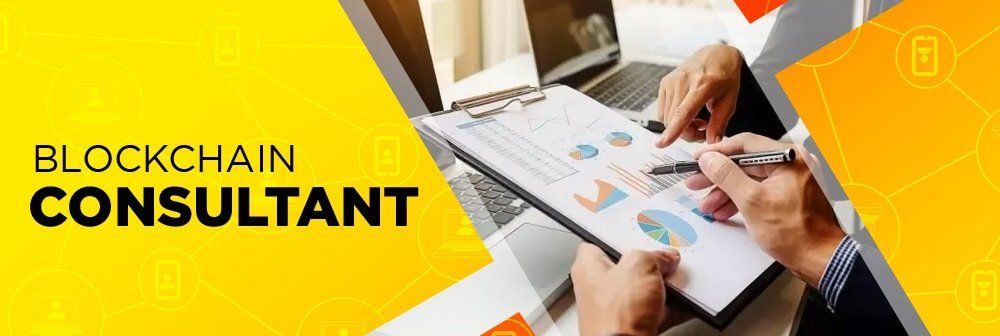
Among the highest-paying jobs in the blockchain sector today is that of a blockchain consultant. These professionals play a crucial role in guiding organizations through the complexities of blockchain adoption and implementation. Their primary responsibilities include developing strategic plans, devising tailored solutions, and offering in-depth technical knowledge to help businesses leverage blockchain technology effectively. Additionally, they must be adept at assessing and managing risks associated with blockchain projects to ensure successful outcomes.
The Role of Blockchain Consultants
Blockchain consultants serve as the bridge between technical blockchain capabilities and business objectives. They engage with clients to understand their unique needs, identify potential use cases for blockchain, and create actionable plans that align with the company’s overall strategy. This role often involves conducting workshops, providing training sessions, and facilitating discussions to educate stakeholders about blockchain’s benefits and challenges.
Why Consultants Are Critical
As businesses increasingly recognize the transformative potential of blockchain technology, the demand for skilled consultants continues to rise. Blockchain consultants play a vital role in helping organizations navigate the complexities of adopting this technology by:
- Assessing Business Needs: Consultants analyze the existing business processes and identify areas where blockchain can add value, whether through increased efficiency, transparency, or security.
- Recommending Solutions: Based on their assessments, consultants propose specific blockchain solutions that fit the organization’s needs, whether that’s a public blockchain, a private blockchain, or a consortium model.
- Guiding Implementation: Consultants oversee the deployment of blockchain solutions, ensuring that they align with the organization’s goals and regulatory requirements. They also facilitate collaboration among different teams, from IT to compliance.
- Change Management: Adopting blockchain technology often requires cultural shifts within organizations. Consultants help manage this change by preparing teams for new workflows, processes, and technologies.
Key Skills Required
To succeed as a blockchain consultant, several key skills are essential:
- Business Acumen: A strong understanding of the client’s industry, pain points, and strategic objectives is crucial. Consultants must be able to contextualize blockchain technology within the client’s operational framework to provide tailored solutions.
- Technical Expertise: While blockchain consultants are not necessarily developers, they must possess a solid understanding of blockchain technology, including its underlying principles, capabilities, and limitations. This knowledge enables them to offer practical and informed advice.
- Regulatory Knowledge: As blockchain operates across international borders, consultants must be well-versed in legal regulations, data privacy laws, and compliance issues. This understanding helps ensure that blockchain implementations adhere to relevant standards and best practices.
- Analytical Skills: It is vital to be able to analyze complex data and draw actionable insights. Consultants need to evaluate the potential impact of blockchain on existing processes and identify metrics for measuring success.
- Communication Skills: Effective communication is key to conveying complex technical concepts to non-technical stakeholders. Consultants must be able to articulate the benefits of blockchain clearly and persuasively, fostering buy-in from all parties involved.
Market Insights
The blockchain consultancy sector is experiencing rapid growth, with an estimated annual increase of 24%. As more companies explore blockchain for process optimization, cost savings, and enhanced security, the need for consultants who can bridge the gap between business and technology has never been more critical. Companies are increasingly seeking professionals who can help them not only understand the technology but also implement it effectively to achieve strategic goals.
According to Glassdoor.com, the average salary for a blockchain consultant is approximately £35,918 annually. However, experienced consultants, particularly those with specialized skills or a strong track record, can command significantly higher compensation.
Future Prospects
The future for blockchain consultants looks bright, with ongoing advancements in the technology and expanding applications across various sectors. As organizations continue to explore innovative use cases for blockchain—ranging from supply chain management to identity verification—the demand for skilled consultants will likely remain robust.
Furthermore, as the blockchain landscape evolves, consultants who stay updated on the latest trends, regulatory changes, and technological advancements will be well-positioned to lead businesses through this transformative journey. By providing the necessary guidance and expertise, blockchain consultants play an essential role in shaping the future of industries that adopt this groundbreaking technology.
8. Blockchain Legal Consultant: Navigating the Regulatory Maze
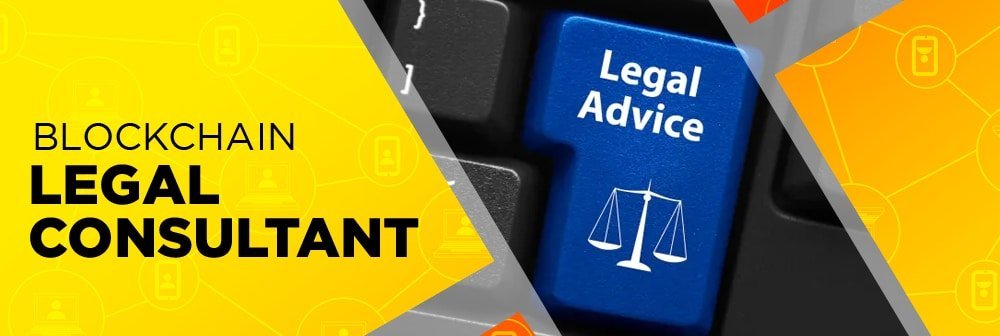
As blockchain technology continues to expand, organizations face a complex web of legal frameworks and regulations. Therefore, it is critical for them to learn the legal jargon associated with blockchain. This growing complexity has created a high demand for blockchain legal consultants. These professionals specialize in the intersection of law and blockchain technology.
Blockchain legal consultants play a crucial role in guiding companies through legal intricacies. They focus on areas like blockchain, cryptocurrencies, and smart contracts. Their expertise is vital for ensuring compliance with local and international laws. As a result, organizations can innovate responsibly while mitigating legal risks.
Moreover, organizations increasingly seek blockchain legal consultants to ensure compliance with regulatory standards. This often involves structuring Initial Coin Offerings (ICOs) and drafting enforceable contracts. Additionally, consultants provide advice on legal obligations related to data privacy and security. Furthermore, these consultants frequently collaborate with legal partners. Together, they create comprehensive compliance strategies tailored to each client’s specific needs.
Role Breakdown
The role of a blockchain legal consultant has rapidly evolved as the technology faces increased scrutiny from regulators worldwide. The following outlines the primary responsibilities and expectations for those in this role:
- Legal Compliance: Consultants must ensure that clients understand and comply with all applicable laws governing blockchain and cryptocurrency operations. This includes analyzing existing regulations and predicting potential legal challenges that may arise as the technology evolves.
- Advisory Services: Blockchain legal consultants provide strategic advice to companies regarding the structuring of their blockchain offerings. This can include assistance with token classifications, regulatory filings, and the overall design of blockchain solutions that comply with legal requirements.
- Contract Oversight: With the rise of smart contracts—self-executing contracts with the terms directly written into code—legal consultants are tasked with advising on their drafting and enforcement. They help ensure that smart contracts are legally enforceable and that clients understand the implications of using automated agreements.
- Risk Management: A critical aspect of the role is advising clients on how to mitigate risks associated with blockchain adoption. This includes assessing potential legal liabilities, developing risk management frameworks, and providing strategies to address regulatory challenges.
- Education and Training: Legal consultants often provide training sessions for clients and their teams on the legal aspects of blockchain technology. This education ensures that all stakeholders understand their legal obligations and the implications of blockchain use.
Key Skills Required
To be successful as a blockchain legal consultant, individuals must possess a combination of legal and technical knowledge:
- Legal Expertise: A deep understanding of local and international laws governing blockchain and cryptocurrency is essential. This includes knowledge of securities regulations, anti-money laundering (AML) laws, and consumer protection statutes.
- Smart Contracts: Legal consultants must be able to advise on the drafting and enforcement of smart contracts. This requires familiarity with the technical aspects of blockchain technology as well as the legal principles that govern contract law.
- Risk Management: An understanding of risk management practices is crucial for advising clients on how to navigate potential legal pitfalls associated with blockchain technology. Consultants should be adept at developing risk assessments and mitigation strategies.
- Strong Communication Skills: Effective communication is vital for conveying complex legal concepts to non-legal professionals. Consultants must be able to articulate legal risks and solutions in a way that is easily understood by clients and stakeholders.
- Regulatory Awareness: It is essential to stay current with the ever-evolving legal landscape surrounding blockchain technology. Consultants should actively monitor regulatory developments and emerging trends in the industry to provide informed advice.
Industry Demand
The legal landscape surrounding blockchain technology is constantly evolving, with countries introducing new regulations around cryptocurrency, data privacy, and fintech. As a result, the demand for legal consultants specializing in blockchain has increased significantly. Key sectors experiencing heightened demand for blockchain legal expertise include:
- Financial Institutions: Banks and financial service providers are increasingly adopting blockchain technology for various applications, including payment systems and asset management. Legal consultants help these institutions navigate the regulatory requirements associated with their blockchain initiatives.
- Tech Startups: Many startups are exploring blockchain solutions to innovate their business models. Legal consultants provide essential guidance on compliance issues, helping these companies launch their products successfully while avoiding legal pitfalls.
- Government Agencies: As governments recognize the potential of blockchain technology, many are seeking legal consultants to develop regulatory frameworks and policies that promote innovation while ensuring consumer protection and compliance.
Salary Expectations
As a blockchain legal consultant, salaries can vary. They depend on experience, location, and the complexity of the work. Generally, annual salaries range from $100,000 to $190,000. Furthermore, experienced consultants in high-demand markets may earn even more. Additionally, those working with larger firms or high-profile clients often receive substantial bonuses and benefits. This further enhances their overall compensation.
In conclusion, the role of a blockchain legal consultant is becoming increasingly critical. In today’s technology-driven world, the demand is rising. As blockchain technology evolves and gains traction across various industries, the need for legal professionals will grow. Specifically, those who understand both the technical and legal aspects of this field are essential. For individuals interested in combining their legal expertise with cutting-edge technology, a career as a blockchain legal consultant offers exciting challenges. Moreover, it provides lucrative opportunities.
9. Blockchain Engineer: Innovating Blockchain Solutions
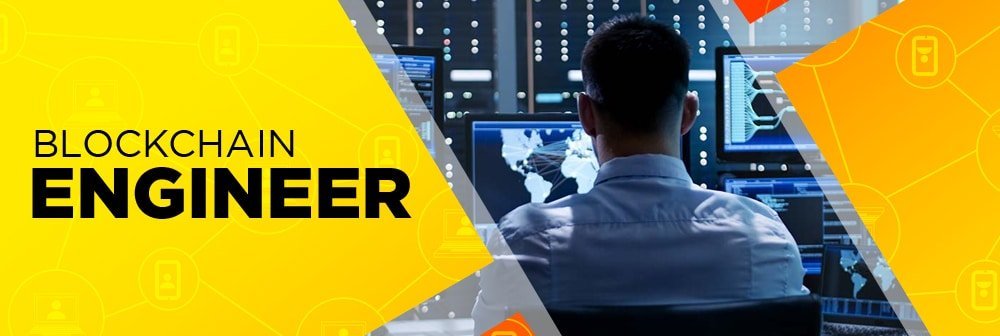
The key role of blockchain engineers is to create applications that meet a company’s technological aspects. The skill that is desired most for professioBlockchain engineers plays a pivotal role in shaping the future of technology by creating applications that align with a company’s technological needs and objectives. They are essential for designing innovative solutions that leverage blockchain technology to enhance efficiency, security, and scalability. A significant aspect of their success in this role is their willingness to learn and adapt to new technologies. This adaptability is crucial as the blockchain landscape is continually evolving.
While programming skills are fundamental, blockchain engineers must also understand the economic implications of blockchain technology. This includes knowledge of concepts such as supply and demand dynamics, incentivization mechanisms, and tokenomics, which are essential for building effective and sustainable blockchain solutions.
Why It’s a Top Career
The role of a blockchain engineer is not just about coding; it’s about innovation. Engineers are tasked with developing new blockchain applications and protocols that address complex technical challenges. They must be able to think critically and creatively to make blockchain technology more efficient, scalable, and secure. Their work can impact various sectors, including finance, healthcare, logistics, and government services, making them key players in the technological revolution.
According to Indeed.com, the average salary for a blockchain engineer is $70,859 per year, but this can vary significantly based on experience, location, and specific industry demands. Experienced engineers can command much higher salaries, especially in high-demand areas.
Key Skills Required
- Blockchain Architecture: A thorough understanding of blockchain’s decentralized nature is essential. Engineers must know how to design systems that not only meet current requirements but are also adaptable to future changes. They should be familiar with consensus algorithms, smart contracts, and the intricacies of public and private blockchain systems.
- Programming Expertise: Proficiency in programming languages is critical for blockchain engineers. Common languages include:
- C++: Widely used in blockchain development for its performance and efficiency.
- Python: Ideal for rapid application development and data manipulation.
- Solidity: The primary language for writing smart contracts on the Ethereum platform.
- Data Structures: Engineers must be adept at utilizing various data structures that underpin blockchain technology. Key structures include:
- Merkle Trees: Used for efficiently storing and verifying data.
- Hash Functions: Crucial for ensuring data integrity and security.
- Problem-Solving Skills: Blockchain engineers must possess strong analytical skills to troubleshoot and solve technical issues. They often encounter complex problems that require innovative solutions, whether optimizing transaction speed or enhancing system security.
- Economic Understanding: Knowledge of blockchain economics is increasingly important. Engineers should understand how to design incentive mechanisms that encourage user participation and ensure the sustainability of blockchain applications.
- Security Awareness: Given the importance of security in blockchain technology, engineers must be well-versed in cybersecurity principles. They should understand how to safeguard blockchain applications against potential threats and vulnerabilities.
Career Outlook
The demand for blockchain engineers is expected to surge. More organizations are recognizing the potential of blockchain technology, which is being applied in areas like identity verification, voting systems, and digital asset management. According to the Bureau of Labor Statistics, blockchain engineering roles are anticipated to grow by 30% over the next decade. This growth reflects the increasing need for skilled professionals in this field.
As blockchain continues to gain traction across various industries, blockchain engineers will be at the forefront of technological innovation. Their ability to create solutions that address real-world challenges will be in high demand. Consequently, this offers not only job security but also opportunities for career advancement and specialization.
Additionally, blockchain engineers enjoy competitive salaries. They may also benefit from flexible work arrangements. Moreover, they have the chance to work on groundbreaking projects that can shape the future of technology. As industries continue to explore the benefits of blockchain, engineers with the right skill set will be highly sought after. Thus, this makes blockchain engineering a promising career path for tech enthusiasts.
10. Blockchain Analyst: Turning Data Into Strategic Insights
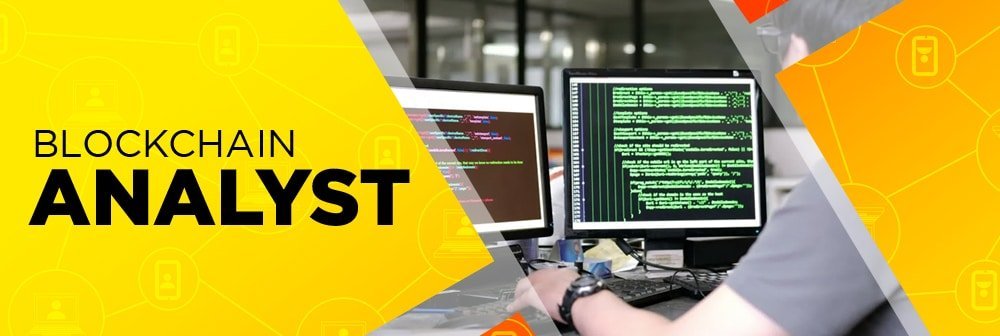
There are two different types of blockchain analysts: risk analysts and business analysts. A risk analyst assesses any existing risk factors related to a Blockchain application. They are responsible for identifying potential threats and offering effective solutions to neutralize or counter thAs blockchain technology continues to transform industries, the demand for blockchain analysts has surged. These professionals play a critical role in interpreting blockchain data to provide actionable insights that guide business decisions and strategies. There are two primary types of blockchain analysts: risk analysts and business analysts.
- Risk Analysts: These analysts focus on identifying, assessing, and mitigating risks associated with blockchain applications. Their responsibilities include analyzing security vulnerabilities, compliance issues, and market risks that could impact blockchain projects. They offer solutions to neutralize or counteract potential threats, ensuring that organizations can confidently invest in and utilize blockchain technology.
- Business Analysts: Business analysts, on the other hand, concentrate on developing strategies that enhance the effectiveness and efficiency of blockchain applications. They evaluate existing blockchain solutions to identify areas for improvement and growth. By understanding business needs and aligning them with blockchain capabilities, these analysts help organizations maximize their blockchain investments.
Why Analysts Are Crucial
Blockchain analysts are vital to the success of blockchain initiatives. They leverage data analytics to extract insights from blockchain transactions and user behavior, helping organizations make informed decisions. Their expertise is particularly important in areas such as risk management, compliance, and operational efficiency.
- Data Analysis: Analysts delve into blockchain data to uncover trends, patterns, and anomalies. By analyzing transaction histories, user engagement, and system performance, they provide valuable insights that can shape business strategies.
- Risk Management: Given blockchain’s decentralized nature, risk analysts evaluate potential threats to security, compliance, and market stability. They play a crucial role in advising organizations on risk mitigation strategies and helping them navigate the complexities of blockchain technology.
- Strategic Alignment: Business analysts ensure that blockchain projects align with the organization’s overall business objectives. They facilitate communication between technical teams and management, ensuring that blockchain solutions effectively address business needs.
Expanded Key Skills Required
To excel as a blockchain analyst, professionals must possess a diverse set of skills:
- Data Analytics: Proficiency in data analysis tools and techniques is essential. Analysts must be able to use software such as Python, R, or specialized blockchain analytics platforms to process and analyze large datasets. Understanding data visualization techniques is also crucial for presenting insights clearly.
- Risk Assessment: Blockchain analysts need to be adept at identifying and evaluating potential risks associated with blockchain implementations. This includes understanding regulatory compliance, cybersecurity threats, and market volatility. They often use risk assessment frameworks to guide their evaluations.
- Business Strategy: Analysts must have a deep understanding of business principles and the specific industry landscape. They must be able to articulate how blockchain solutions can drive business value and fit within broader strategic goals.
- Blockchain Knowledge: A comprehensive understanding of blockchain technology, including how different consensus mechanisms work and the specific use cases of blockchain in various industries, is essential for effective analysis.
- Communication Skills: Analysts must effectively communicate their findings and recommendations to both technical and non-technical stakeholders. Strong verbal and written communication skills are critical for presenting data insights in an understandable manner.
- Problem-Solving: Analysts should have strong problem-solving skills to identify areas of improvement within blockchain systems and propose innovative solutions that leverage blockchain technology.
Industry Insights
As organizations increasingly recognize the value of blockchain analytics, the demand for blockchain analysts is expected to grow. According to industry reports, the blockchain analytics field is projected to expand by 15% annually, driven primarily by sectors such as finance and healthcare. In these industries, blockchain data can offer crucial insights for decision-making, compliance, and risk management.
- Finance: Blockchain’s potential to enhance transparency and efficiency in financial transactions makes it a focal point for analysts. By analyzing transaction data, blockchain analysts can help financial institutions mitigate fraud risks and optimize their operations.
- Healthcare: In healthcare, blockchain analytics can provide insights into patient data management, supply chain transparency, and regulatory compliance. Analysts help healthcare organizations leverage blockchain to improve patient care and operational efficiency.
- Supply Chain: Analysts are also vital in supply chain management, where blockchain can improve traceability and accountability. By analyzing blockchain data, organizations can gain insights into supply chain performance and identify areas for optimization.
According to a survey conducted by Indeed.com, the average salary for a blockchain risk analyst is $93,291 per annum. This competitive salary reflects the specialized skills required for the role and the growing demand for analysts who can harness blockchain data effectively.
In summary, blockchain analysts are essential players in the blockchain ecosystem, transforming data into strategic insights that drive business success. Their expertise in risk assessment, data analysis, and business strategy positions them as key contributors to the evolution and implementation of blockchain technologies across various sectors. As the industry continues to grow, blockchain analysts will play a pivotal role in shaping the future of decentralized systems.
FAQs About Blockchain Jobs
1. What are Blockchain Jobs?
Blockchain jobs refer to various career opportunities that involve working with blockchain technology. These positions range from developers and architects to project managers and legal consultants, all focusing on the implementation, maintenance, and advancement of blockchain systems.
2. Why are Blockchain Jobs in high demand?
The demand for blockchain jobs is driven by the increasing adoption of blockchain technology across industries such as finance, healthcare, and supply chain. As organizations seek to leverage blockchain’s benefits—such as transparency, security, and efficiency—qualified professionals with blockchain skills become essential.
3. What qualifications are needed for Blockchain Jobs?
Qualifications for blockchain jobs vary by role but generally include a strong understanding of blockchain principles, programming skills (such as proficiency in languages like Solidity or Java), and knowledge of cryptography. Many positions also benefit from certifications in blockchain technology.
4. What is the salary range for Blockchain Jobs?
Salaries for blockchain jobs vary widely based on experience, location, and specific roles. Entry-level positions may start around $70,000 annually, while senior roles such as blockchain architects or consultants can earn upwards of $150,000 or more, reflecting the high demand and skill scarcity in this field.
5. Are Blockchain Jobs suitable for beginners?
Yes, while some blockchain jobs require advanced skills, there are entry-level opportunities available. Beginners can start with foundational courses in blockchain technology, programming, and networking to build the necessary skills for a career in this growing field.
6. How can I find Blockchain Jobs?
To find blockchain jobs, you can utilize job search platforms such as LinkedIn, Indeed, and Glassdoor. Networking with professionals in the field, attending blockchain conferences, and joining relevant online communities can also provide valuable job leads and insights.
7. What industries are hiring for Blockchain Jobs?
Various industries are hiring for blockchain jobs, including finance, healthcare, supply chain, government, and technology. As blockchain technology continues to evolve, more sectors are exploring its potential, leading to increased job opportunities.
8. What skills are essential for Blockchain Jobs?
Essential skills for blockchain jobs include programming languages (e.g., Python, C++, Solidity), understanding of smart contracts, cryptography, and familiarity with blockchain platforms like Ethereum or Hyperledger. Soft skills like problem-solving, communication, and project management are also valuable.
9. Can Blockchain Jobs be done remotely?
Many blockchain jobs can be done remotely, especially those of developers, consultants, and project managers. Blockchain technology’s digital nature allows for flexible work arrangements, making it an attractive option for professionals seeking remote opportunities.
10. What is the future outlook for Blockchain Jobs?
The future outlook for blockchain jobs is promising, with continued growth expected as more businesses and industries adopt blockchain solutions. As technology advances and new applications emerge, the demand for skilled blockchain professionals is likely to increase, providing ample opportunities for career advancement.
Final Remark
With all the information on the highest-paying blockchain jobs, it’s up to you to settle on what meets your interests. However, you ought to remember that there are various positions still in the blockchain sphere to which one can send their application. The basis is your educational background, expertise as well as the experience you have in a specific industry. It’s advisable to pursue a job in an industry that has the potential for growth as it’s more advantageous. Still, it’s best to apply for a position that you know you’re highly qualified for.
As the world gravitates towards blockchain technology, there is an immense opportunity for you to build an outstanding career in a blockchain-related job. The truth is blockchain is not about to crumble or disappear anywhere in the future. Because of this, the need for jobs will grow, and with such is the growth in demand for expertise in the field. With the favorable pay attached to a high demand for the right skillset in block technology, it’s time to position yourself right. You need to pursue and earn a blockchain expert credential and prepare yourself to reap great benefits from your effort.
If you’re completely new to blockchain technology, you need not worry. You have a chance to begin from the basics and go all the way to becoming a blockchain expert.
May your career journey be exciting!
So, what are you waiting for?
Get started with the best Blockchain Certification Courses here.
